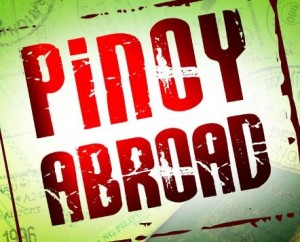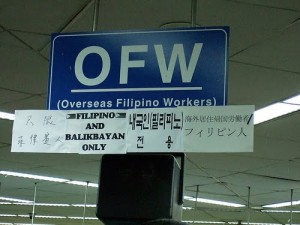5 Simple Ways for OFWs to Invest in the Philippines
By Randell Tiongson on May 13th, 2015
 OFWs are generally the kind of people who leave home because they want to provide for their respective families, others still are looking to broaden their life experiences by working abroad for a time. With their time working abroad comes the idea of eventually putting the money they’ve worked hard for to good use.
OFWs are generally the kind of people who leave home because they want to provide for their respective families, others still are looking to broaden their life experiences by working abroad for a time. With their time working abroad comes the idea of eventually putting the money they’ve worked hard for to good use.
Most will find themselves putting that money towards small businesses that their families can run in their stead; others will start a savings account and allow the money they deposit to incur interest. There are other ways to grow one’s hard-earned money, such as investing.
Many people find the idea of investing somewhat daunting – the most common reaction is usually “don’t you have to study the stock market to get anything done?” There is a certain amount of study that comes with investing, but there are a number of accessible investment platforms available to the average OFW, and are usually tailored to one’s Risk Profile.
A Risk Profile basically determines how aggressive someone is when it comes to making an investment, or one’s Risk Appetite. The first thing anyone wanting to start an investment portfolio is to take a client suitability assessment questionnaire, which will allow you to see exactly what kind of investment vehicle best applies.
Of course, the kind of investment vehicle you choose depends on the amount of money you choose to risk, hence the need for one to take the assessment.
There are several ways to start your investment portfolio, and here’s five:
Mutual Funds
By far, investing in a Mutual Fund appears to be the simplest of the options when it comes to investment vehicles. This type of investment takes most of the work out of your hands and places it in the very capable ones of fund managers. Their job will be to grow the money you invested, without you having to monitor it constantly.
Here’s a list of mutual fund investments that you can access online:
Stock Investments
Arguably, investing in publicly traded stocks requires a certain kind of aggression in terms of your risk appetite, and some research. Buying stocks basically means becoming a shareholder in a publicly traded company. Being a shareholder means you own a part of the company, but only so far as much stock that you own in said company. The bigger your stock, the more you can participate, and the more you earn depending on the company’s performance.
stocks basically means becoming a shareholder in a publicly traded company. Being a shareholder means you own a part of the company, but only so far as much stock that you own in said company. The bigger your stock, the more you can participate, and the more you earn depending on the company’s performance.
Getting started requires opening an account with a broker, and here’s a list of online stock brokers accredited by the Philippine Stock Exchange:
Unit Investment Trust Fund (UITF)
This form of investment involves holding a certain amount of money in trust as part of the investment made. It shares a similar structure to mutual funds in the aspect that your money will be managed by fund managers. This is usually offered by banks, and differs from mutual funds because they revolve per unit investment, as opposed to the shares in a mutual fund.
Here’s a partial list of banks that offer UITFs:
- Metrobank
- BDO
- Union Bank
- BPI
- PNB
- Chinabank
- Security Bank
- EastWest Bank
Bonds
Given the propensity of OFWs to save their money in bank accounts, an investment vehicle that may also be available to them comes in the form of Bonds. This form of investment is generally offered by large corporations and government offices (Retail Treasury Bonds) as a means of raising funds or essentially borrowing from the public. They have a fixed maturity date.
Here’s a few banks that also act as gateways to purchasing Bonds
- PNB
- BDO Unibank
- BPI
- Metrobank
Real Estate
This type of investment isn’t necessarily unusual, but leans more towards preparing for a future home, or somewhere to put up a business. This form of investment requires a higher amount of money to start with as opposed to say, mutual funds. The money invested into real estate generally means having enough to make the payments to the land that you have purchased, and the lower the interest rate, the better.
What may eventually earn money from investing in real estate is the way land use changes over the years. One can acquire property through the Register of Deeds, but make sure to check the land title for encumbrances (mortgage, debts, and the like).
These are just some of the ways that OFWs can invest in the Philippines. It mostly takes a certain amount of patience and research before you pick your investment gateway.
Mendicancy Culture among Filipinos
By Randell Tiongson on May 12th, 2015
Mendicancy Culture among Filipinos – Is it a Bad Thing?
Poverty is one critical problem that the country continues to face. Although figures show that our economy is growing, more and more  Filipinos still consider themselves poor, and that is not difficult to prove. Roam around the streets of Metro Manila and you will see beggars, children selling goods, unsightly shanties or families living under the bridge. With many Filipinos living below the poverty line and with very few employment or livelihood opportunities, some become desperate and resort to begging. Begging is an obvious form of mendicancy, but it is far from the only one.
Filipinos still consider themselves poor, and that is not difficult to prove. Roam around the streets of Metro Manila and you will see beggars, children selling goods, unsightly shanties or families living under the bridge. With many Filipinos living below the poverty line and with very few employment or livelihood opportunities, some become desperate and resort to begging. Begging is an obvious form of mendicancy, but it is far from the only one.
What are the other signs that tell we are already developing a culture of mendicancy, and is this ever a good thing?
What is Mendicancy Culture?
Medicancy in itself is defined as “the practice of begging, as for alms”. As it applies to culture, the practice of relying on handouts or the “kindness” of people for money or other forms of help. A culture of mendicancy basically creates people who may always be waiting on handouts; expecting that others with more means will readily assist them, thereby taking away the need or the urgency to make their own way in life.
More Obvious Forms
If you are a Filipino commuter, you may find it common to see individuals riding buses, pretending to be Bible preachers and collecting money afterwards. They pass out white envelops to passengers for donations. Children who jump onto jeepneys cleaning shoes might not be new scenery to you. These street kids quickly clean passengers’ shoes by simply wiping it with a rug, then later ask for money. You may see adults carrying infants, beggars singing or playing instruments, and many others. Filipino tribes coming from different provinces asking for money in the city is also not a usual sight. There are Aetas, Badjaos, Igorots and other groups who would often travel during Christmas season to beg for alms. These are among the most obvious forms of mendicancy, and surely, you can name more when asked.
Less Obvious Forms
It is easy to name the obvious forms of begging we see in the country, but there are less obvious forms we might not even be aware of. Our country gets more than our share of typhoons a year. In fact, an average of 19 typhoons enter the Philippine Area of Responsibility annually. There is no need to ask why, because we can never control the forces of nature. Instead we need to focus on our preparedness and the ability to bounce back after a disaster.
It is a fact that we are one of the most disaster-hit nations, and this also puts us on international news. The result? Many countries offer aid in different forms. It is not a bad thing to receive help, especially if voluntarily given. However, since we lack preparedness and rehabilitation plans after a disaster, foreign countries tend to see us rather helpless and cannot help but offer their help. We, on the other hand, somehow get used to their assistance and expect help every time we are hit by a disaster. Shouldn’t we be improving our plans on how we can avoid as many people to be victims of typhoon or think of ways on how we can build stronger homes?
The number of overseas Filipino workers is constantly increasing. This still has a lot to do with poverty, but what does it have to do with mendicancy? The billions of yearly remittances help the economy, and these remittances are also what OFW families use to afford a more comfortable life. There is danger that the OFWs’ families may become dependent on them, and we can already see this in reality. There is also a tendency for the country to become overly dependent on remittances instead of pursuing better economic development plans.
A culture of mendicancy is obviously a dark phenomenon. It does reflect inability to fight poverty, unwillingness to strive harder in life, and dependency. Every individual, regardless of sex and race, has to have the drive to make him or herself better. We have to continually grow and improve not just in terms of the ability to earn money, but to improve oneself. Filipinos should not always live by others’ generosity. Surely, there are struggles and sufferings, but we must take these as challenges to strive harder in life. We all have to learn about self-fulfillment and dignity. We only have one life to live, so we better make the most of what we can.
References:
http://english.safe-democracy.org/2008/07/08/mendicancy-in-the-philippines/
http://globalnation.inquirer.net/50520/ofw-remittances-promote-mendicant-culture/
iCon2015: The biggest investment event of the year!
By Randell Tiongson on May 4th, 2015
It’s back! The biggest finance & investment event of the year — iCon2015!
Our annual conference will be this May 30, 2015 at the SMX in Mall of Asia. Joining me in this empowering conference for this year are:

Marvin Germo – one of the most sought after stock market experts and will talk about stress-free investing in the stock market. Marvin is the author of 2 best-selling books on stock market investing and one of the most visible investment advocates.
Mike Manuel – the Chief Investment Officer of Sun Life in Asia. Mike is an accomplished fund manager for over 2 decades and his team manages one of the largest funds investment funds in the country. He will be speaking on growing trends in investments and how to properly invest for the future.
Efren Ll. Cruz – one of the fore runners of the financial advocacy in the Philippines and has 3 decades of experience in the various facets of investment and financial industry. He is a best-selling author, columnist and one of the most in demand finance trainers in the country. Efren will give us a presentation on investment management.
Chinkee Tan – Mr. Chink+ and the wealth coach of the masses! He is ann award wining media practitioner, best seller of multiple books and one of the most active personalities that encourages Filipinos to be financially empowered. Chinkee will give a talk on the value of entrepreneurship in growing your wealth.
Francis J. Kong – the country’s number one motivational speaker, multi-award winning media practitioner, best-selling author of over 10 books and truly an inspiring coach. Francis will give a powerful and life-changing talk on “beyond investing”.
Aside from our powerful platform speakers, we will have a special session during the lunch break with Dr. Alvin Ang, PhD on the impact of the ASEAN integration on investing and Jess Uy on growing trends on global investing.
I will be speaking on balancing finances and investments and will do an overview of growing trends that will affect investing.
iCon 2015, just like the earlier previous conferences is not only power-pack, informative and insightful, it is also empowering!
For inquiries, please click HERE or send a message to deniece@brandspeakasia.com or 0917-8482974
 OFWs are generally the kind of people who leave home because they want to provide for their respective families, others still are looking to broaden their life experiences by working abroad for a time. With their time working abroad comes the idea of eventually putting the money they’ve worked hard for to good use.
OFWs are generally the kind of people who leave home because they want to provide for their respective families, others still are looking to broaden their life experiences by working abroad for a time. With their time working abroad comes the idea of eventually putting the money they’ve worked hard for to good use. stocks basically means becoming a shareholder in a publicly traded company. Being a shareholder means you own a part of the company, but only so far as much stock that you own in said company. The bigger your stock, the more you can participate, and the more you earn depending on the company’s performance.
stocks basically means becoming a shareholder in a publicly traded company. Being a shareholder means you own a part of the company, but only so far as much stock that you own in said company. The bigger your stock, the more you can participate, and the more you earn depending on the company’s performance.


